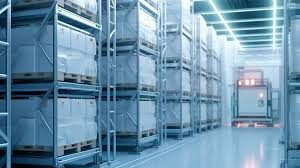 The commercial real estate landscape is undergoing a dramatic transformation, driven by the surging demand for cold storage facilities. With the rise of e-commerce, shifting consumer preferences, and advancements in industries like food and pharmaceuticals, the need for temperature-controlled spaces to store perishable goods is more pressing than ever. Here’s an in-depth look at the factors fueling this trend and how it’s reshaping the real estate market.
The commercial real estate landscape is undergoing a dramatic transformation, driven by the surging demand for cold storage facilities. With the rise of e-commerce, shifting consumer preferences, and advancements in industries like food and pharmaceuticals, the need for temperature-controlled spaces to store perishable goods is more pressing than ever. Here’s an in-depth look at the factors fueling this trend and how it’s reshaping the real estate market.
The Rising Need for Cold Storage
Cold storage facilities are essential for maintaining the quality and safety of perishable goods such as food, pharmaceuticals, and even flowers. Several factors have propelled the growing demand for these specialized spaces:
E-commerce and Grocery Delivery
The explosive growth of online grocery shopping, accelerated by the COVID-19 pandemic, has made cold storage a cornerstone of logistics. Companies like Amazon Fresh and Instacart require extensive networks of refrigerated warehouses to ensure fresh and frozen products reach consumers quickly and safely.
Pharmaceutical Advancements
The pharmaceutical industry has become a major driver of cold storage demand, particularly for temperature-sensitive products like vaccines and biologics. The distribution of COVID-19 vaccines highlighted the critical role of ultracold storage facilities, further expanding the market for this specialized infrastructure.
Evolving Supply Chains
As global supply chains grow more complex, the demand for efficient cold storage at strategic logistics hubs such as ports and distribution centers has surged. The year-round consumer appetite for fresh produce and the globalization of food trade have added further impetus to this trend.
Impact on Commercial Real Estate
The rapid rise in cold storage demand is reshaping priorities across the commercial real estate sector in the following ways:
Increased Investments in Cold Storage Facilities
Cold storage is emerging as one of the most profitable segments in commercial real estate. Many investors are converting traditional warehouses or developing new state-of-the-art facilities to meet demand. Dov Hertz, founder of DH Property Holdings and a prominent NYC real estate developer, says “Cold storage facilities are highly in demand in the NY area and we can expect to see significantly more developments in this sector over the next few years.”
Rising Property Values
Properties with cold storage infrastructure command premium prices due to their specialized nature. As Dov Hertz explains, “Advanced refrigeration systems, superior insulation, and reliable temperature-monitoring technologies significantly enhance property value.”
New Development Trends
Developers are increasingly designing multipurpose facilities that blend cold and ambient storage to attract diverse tenants. Urban infill projects, located closer to densely populated areas, are also gaining momentum to support faster delivery times and reduce transportation costs.
Technology Integration
The integration of cutting-edge technology has become a hallmark of modern cold storage facilities. IoT-enabled temperature sensors, AI-powered inventory management, and automation systems enhance efficiency and appeal to tenants seeking reliable and cost-effective operations.
Challenges in the Cold Storage Market
Despite its promise, the cold storage market faces some hurdles:
- High Costs: Building and maintaining cold storage facilities requires significant investment, which can deter some investors.
- Location Limitations: Securing urban-adjacent sites while complying with zoning laws and environmental regulations poses a challenge for developers.
Looking Ahead
The future of the cold storage market looks bright, with projections indicating a compound annual growth rate (CAGR) exceeding 13% through 2030. The continued growth of the food, pharmaceutical, and e-commerce industries will ensure cold storage remains a vital component of commercial real estate.
“Cold storage is increasingly becoming a defining factor in the priorities of the commercial real estate sector,” says Dov Hertz. “Developers, investors, and property managers are actively innovating to address the rising demand for cold storage. As industries continue to evolve, these facilities will remain a key driver of transformation in the market.”
The growing demand for cold storage facilities is revolutionizing the commercial real estate market in greater New York City and throughout the East Coast. By addressing the evolving needs of industries and consumers, cold storage is creating lucrative opportunities for developers and investors. As this trend continues, it will undoubtedly shape the future of real estate, ensuring perishable goods are stored and delivered with unmatched efficiency.
You may also want to read the related article:
DH Property Holdings buys 365,000 sq. ft. industrial portfolio in Cherry Hill, Blackwood


